#Gurkha Regiments
Text
There are about 35,000 Nepali Gurkhas currently serving in the Indian army, including in the geopolitically sensitive region of Indian-administered Kashmir and the northeastern parts of the country. The Gurkhas have a strong bond with the Indian military, and Gurkha regiments have become part of the culture of the Nepali hill communities. There are about 120,000 Indian Gurkha veterans living in Nepal. Their pension and other benefits have contributed to the economy of the impoverished hill regions.
Anbarasan Ethirajan, ‘Agnipath scheme: The pain of Nepal's Gurkhas over Indian army's new hiring plan’, BBC
#BBC#Anbarasan Ethirajan#Nepali Gurkhas#Indian army#Indian-administered Kashmir#Gurkhas#Gurkha regiments#Nepali hill communities#Indian Gurkha veterans#Nepal
4 notes
·
View notes
Text

In early April, 1982, the P&O Liner, Canberra, was on a Mediterranean cruise when her captain, Dennis (DJ) Scott-Masson, received orders to put in at Gibraltar. He there received instructions to proceed immediately to Southampton under Admiralty orders. (It's unclear exactly where the poor passengers were kicked off).
Within a week, and after a hasty refit which included the installation of helipads, the Canberra set sail for the Falklands, with a reduced volunteer crew and, depending on the source, either 2 000 or 3 000 commandoes of the Royal Marines and Parachute Regiment.
She was taken close inshore in San Carlos Water on May 21st, the first of three occasions, to disembark the troops.
Captain Scott-Masson was later interviewed for the ABC Australia documentary series, Liners: Ships of Destiny. He recalled;
"...Our major fear was that we would be hit by bombs or an Exocet, the ship’s superstructure was built of aluminium, and fire would have been our worst hazard, and that is what we worried about..."
He also conceded that the extreme danger did slightly disrupt shipboard routine;
"...There was one night we didn’t have a drink with dinner, didn’t have wine with dinner... was the night we went into San Carlos..."
The QEII was also on troopship duties, but remained well outside of the battle zone, her own contingent of Guards, Gurkhas and Blues and Royals shuttled from her position off South Georgia in the Canberra.
A contributor to Liners: Ships of Destiny explained why;
"...(The QEII) couldn’t really be exposed to danger, the thought of risking losing the ship that had the same name as the Sovereign was more than the politicians could bear. The fact that the Canberra was exposed didn’t really matter, after all it was only the capital of Australia..."
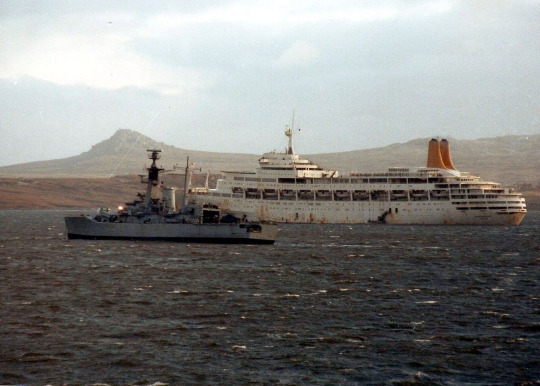
The Canberra and 2500 troops returned safely to Southampton on July 11th, welcomed by around 250 000 people.

The Canberra was paid off in 1997, after 36 years of service.
Captain Scott-Masson passed away in 2010, aged 81.
Captain Scott-Masson's son is the actor, William Scott-Masson


Additional background from Royal Marines History and https://www.peterghore.co.uk
#falklands war#maritime history#social history#ocean liners#royal marines#military history#1980s#margaret thatcher#parachute regiment#gurkha#guards#blues and royals#cruise ship
85 notes
·
View notes
Text


His Majesty King Charles III has presented new standards and colours to the Royal Navy, the Household Cavalry Mounted Regiment and Grenadier Guards from the British Army, and the Royal Air Force in Buckingham Palace last week.
As the nation prepares to celebrate the Coronation of His Majesty The King, we dive into the British Army’s contribution to the big day’s pomp and ceremony you may not be familiar with.
Gold Stick in Waiting
A prominent role on 6 May will be played by Lieutenant General Sir Edward Smyth-Osbourne KCVO CBE, Colonel, The Life Guards and Gold Stick in Waiting.
This senior Army officer will ride on the wheels of the Gold State Coach during the Procession from Buckingham Palace to Westminster Abbey.
Gold Stick in Waiting was created because of a conspiracy during the reign of Henry VIII, when the King was supposed to be in danger.
A trusted courtier was ordered to always be by the King’s side, carrying an ebony staff with a gold head.
On the Restoration in 1660, this task fell to the Colonel of The Life Guards.
A second Army officer, Silver Stick, was also placed close to the sovereign as Gold Stick’s deputy to protect the King or Queen from danger.
The role of Gold Stick, now only demonstrated on ceremonial and state occasions, is held jointly by the Colonels of the Life Guards and the Blues and Royals, taking it in turns by monthly rota, both being Regiments of the Household Cavalry of the Household Division.
The Silver Stick is the Commander of the Household Cavalry, who holds the rank of colonel and oversees all Household Cavalry duties for the sovereign.
After the new King has been crowned at Westminster Abbey, the role of Gold Stick in Waiting will be played by The Colonel of The Life Guards, as it is their Sovereign’s Standard on parade.
The Princess Royal will ride on horseback behind the Gold State Coach back to Buckingham Palace as Colonel of the Blues and Royals and senior Colonel of all The Household Division Regiments.
Anointing Screen Bearers
Six members of the Army’s Household Division will carry out the sacred duty of carrying the Anointing Shrine/Screen that will cover and protect the Sovereign and Queen Consort while sacred oils are applied by the Archbishop of Canterbury in Westminster Abbey during the Coronation service.
Colours
All British Army units taking part in the Coronation Procession will proudly carry their Colours, Standards or Guidons.
Infantry Colours are among the most sacred symbols of the British Army. These flags embody the honour, spirit and heritage of the regiments that proudly carry them.
Historically, the practice of carrying Colours, Standards or Guidons served to act as a rallying point for troops in the smoke and fog of battle.
British and Commonwealth infantry regiments usually have two colours, collectively called a stand.
The King's/Queen’s Colour is typically a union flag trimmed with gold fabric and with the regiment's insignia in the centre.
It reminds all ranks of their loyalty and duty to their sovereign.
The Regimental Colour is a flag of a single colour - usually the colour of the regiment's uniform facings (collar, lapels and cuffs) - again trimmed and with the insignia in the centre.
Handmade from precious silks, silver and gilt threads, the Colours are used on the regiment's most important occasions and bear the battle honours, or those inherited from its predecessors, and symbols of the battalions.

Standards and Guidons
In the British Army’s cavalry units, the King’s Cavalry Standard and the Regimental Standard (for the heavy cavalry) and the King’s Cavalry Standard and Regimental Guidons (for the light cavalry) are the equivalents to Infantry Colours.
The two units that make up the Household Cavalry have their own unique Standards.
The Life Guards only carry the King’s Standard, whereas the Blues and Royals carry the King’s Standard and may carry the regimental Guidon.
The Standard is “senior” to a colour or guidon.
In the past, Cavalry would bear Guidons, which are smaller and lighter for carrying into battle on horseback.
In contrast, Infantry, who traditionally fought on foot, have the larger, heavier Colours, which are more easily seen from the ground.
The Sovereign’s Standard of the Life Guards is made of silk damask, with gold thread embroidery and fringe.
It bears the Royal Arms and the battle honours of the Regiment.
Queen’s Truncheon
Proudly marching down The Mall with all other British Army units during the Coronation Procession will be soldiers from The Royal Gurkha Rifles (RGR).
However, unlike their fellow service men and women carrying Colours, Standards and Guidons, the soldiers from Nepal will carry a ceremonial staff, known as the Queen’s Truncheon.
This serves as the equivalent of and is carried as the Regimental Colour.
The staff originates in the Indian Mutiny during 1857-8 when the Sirmoor Battalion (which later became the 2nd KEO Goorkhas, 2 GR) remained loyal to the British Crown.
The Battalion, together with the Guides and the 60th Rifles, held a key position for over three months of constant attack, suffering 327 casualties out of a total strength of 490.
After the mutiny, the 2nd Goorkhas were designated as a Rifle Regiment as a mark of the bond created with the 60th Rifles.
Queen Victoria directed the Battalion be awarded a special truncheon to replace the Regimental Colours that could no longer be carried by a Rifle Regiment.
The ornate Gurkha Truncheon was given to the Rifles by order of Queen Victoria in 1863.
Also known as ‘Nishani Mai’, meaning symbol of the great mother, the Queen’s Truncheon was carried by 2 GR until The Royal Gurkha Rifles were formed in 1994, when it was laid up.
The Queen’s Truncheon remains in service with The RGR and is still accorded the honours due to a Queen’s Colour of Infantry.
The Queen’s Truncheon was also on parade during the 1953 Coronation of Queen Elizabeth II.
This was the first time the Truncheon was presented to the sovereign. It was then presented a further seven times with the last being in 2019.
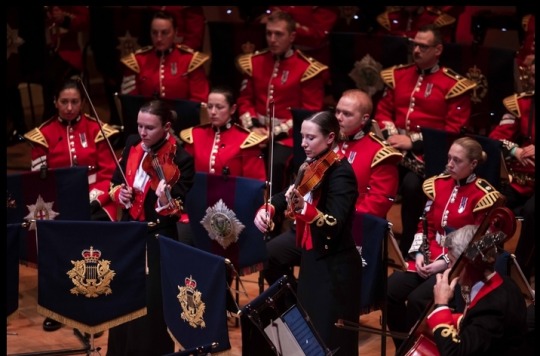
Military music
Bands from the Royal Corps of Army Music will perform on 6 May, with a 50-piece mounted band of musicians from The Band of the Household Cavalry leading the Coronation procession.
Four State Trumpeters from the Band of the Household Cavalry will perform fanfares in Westminster Abbey for the Coronation Service.
The State Trumpeters are professional musicians from the Royal Corps of Army Music and uniquely have to attend military riding school before being selected for a role in which they will have had to memorise up to 22 different fanfares.
Bands from the Foot Guards will be positioned throughout the procession and at key points along the route to keep the procession to time and to entertain the crowds.
During the coronation procession, the British Army Band Colchester will perform as a massed band with British Army Band Sandhurst.
Garrison Sergeant Major Andrew Stokes will be at the side of the Gold State Coach and will have the key role of stepping off the procession from his position in Parliament Square.
He has designed a method of uniting all 19 processional bands to strike up at the same time and maintain a constant beat, whilst playing the same bar, with bands separated by distance across a procession group over a mile long.
Bands from the Royal Corps of Army Music deliver musical support to the Army and across Defence, as well as supporting State ceremonial occasions such as the King’s Coronation.
During the coronavirus pandemic, the Army’s bands helped to raise morale by performing at major national events, including VE and VJ Day, the Queen’s Birthday, national Acts of Remembrance, and New Year’s Eve TV celebrations.
The Royal Corps of Army Music also released free to download music for public enjoyment, online tutorials for aspiring musicians and virtual masterclass workshops for schoolchildren.

#King Charles III#His Majesty The King#Coronation 2023#Coronation Service 2023#Coronation#Coronation Service#British Army#Gold Stick in Waiting#Silver Stick#Coronation Procession#Princess Royal#Infantry Colours#Regimental Colour#Life Guards#Sovereign’s Standard of the Life Guards#The Royal Gurkha Rifles (RGR)#Queen’s Truncheon#Gurkha Truncheon#Queen Victoria#Nishani Mai#Queen Elizabeth II#Royal Corps of Army Music#The Band of the Household Cavalry#State Trumpeters
5 notes
·
View notes
Photo

“How Singapore Defenders Slosh Malayan Swamps,” Kingston Whig-Standard. January 6, 1942. Page 1.
-----
Advancing through the swampy jungles of Malaya, wary troops of the British 9th Gurkhas, pictured on manoeuvres, now battle Japanese invaders of the peninsula.
#malayan campaign#british malaya#invasion of malaya#british empir#gurkhas#9th Gorkha Rifles#gurkha regiment#gurkha rifles#british indian army#british empire#world war II#pacific war#imperial japanese army#imperial japan
2 notes
·
View notes
Text
Dagshai Jail Museum | Explore The Past
1890: Dagshai Jail A British-era garrison jail built in 1849 was transformed into a museum in 2011. It’s the second prison of its sort in India, after the Andamans Cellular Jail.
This T-shaped, fortress-like edifice is positioned on a steep hill. Its 54 high-security cells, some for solitary confinement, feature over-engineered iron grill gates with the largest bolts and keyholes ever. An…
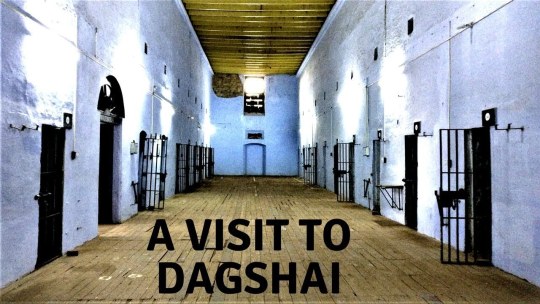
View On WordPress
#Andamans Cellular Jail#Dagshai Jail#Dagshai Jail Museum#Eamon de Valera#Irish Catholic troops#Komagata Maru#Nasiri Regiment#Nasiri Regiment (1st King George&039;s Own Gurkha Rifles#Nathuram Godse
0 notes
Text
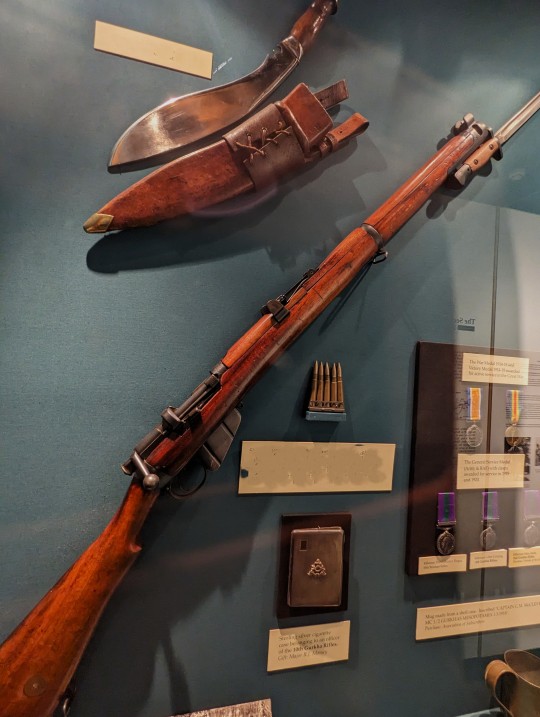

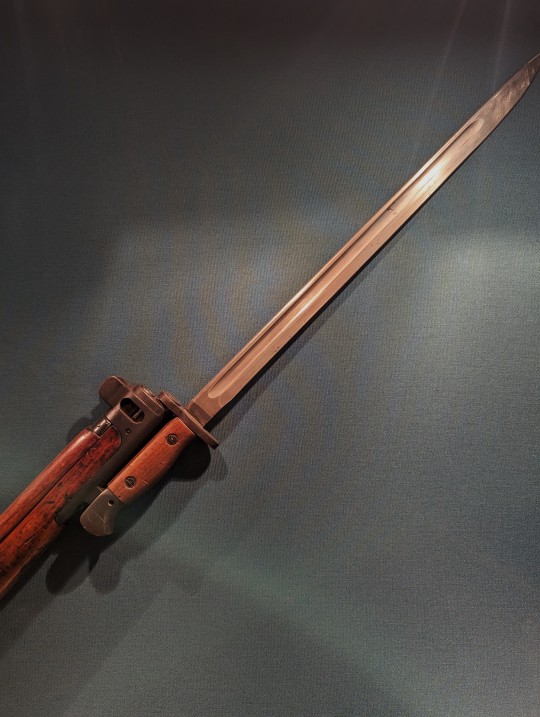
Short Magazine Lee Enfield Rifle Mark III and Sword Bayonet from the British Empire dated between 1914 - 1918 on display at the Gurkha Museum in Winchester, England
This rifle and bayonet was used by one of the Gurkha Regiments in the British Indian Army during the First World War. The Mark III was the standard rifle used by the soldiers of the British Empire during the First World War.
Photographs taken by myself 2023
71 notes
·
View notes
Text
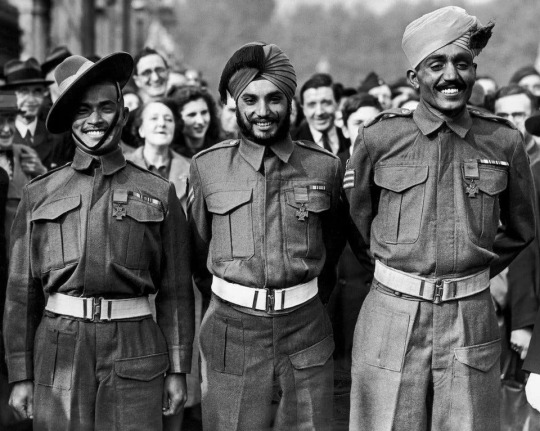
Three recipients of the Victoria Cross, October 1945, Left to right: Naik Bhabbhagta Gurung of the 2nd Gurkha Rifles, Naik Gian Singh of the 15th Punjab Regiment and Havildar Umrao Singh of the Indian Artillery
59 notes
·
View notes
Text
Surprising number of people on here evidently don't know about Gurkha regiments.
26 notes
·
View notes
Text
On one hand, only having the Tuskagee Airman in Episode 8 makes sense - the 99th Fighter Squadron, which I think is the one they're portraying, was in Italy until summer 1944. On the other hand, I absolutely understand people being disappointed that they only appear now. On that note, I've been thinking of possible subjects for a POC-focused WWII miniseries. I've got a few ideas - wondering what you think.
This is largely combat unit focused too, so if anyone has other suggestions I'd love to hear them. I am looking forward to that film on the 6888th, hope that's good.
The big one is probably the 442nd Regimental Combat Team, which consisted of Japanese-Americans and was the most decorated combat unit of the war for the United States.
Either the 92nd or 93rd Infantry Regiments, both African-American - the former faced particularly severe racism from their commander, a white supremacist, piece-of-shit and all-round incompetent by the name of Ned Almond.
The 99th Fighter Squadron - they're appearing in Masters of the Air but they deserve their own series.
Any of the African-American tank units at the close of the war.
Literally anything, ever, on the British Indian Army or the Gurkhas. You could complicate this by having some of the characters end up in Bose's INA and others remain with the British.
A miniseries based on the life of Reg Saunders, one of the first indigenous Australian army officers.
And while it's WWI, the Harlem Hellfighters are overdue for onscreen rep.
17 notes
·
View notes
Text
After a very rigorous inspection at Wellington Barracks, from Friday 19th April 2024 the Gurkha regiment will take over guard duties at The Tower of London, St James's Palace and Windsor Castle. They will also be at Buckingham Palace after Sunday's London Marathon.
This is the first time in their 75 year history that the Queen's Gurkha Signals have taken on the public ceremonial duty of guarding the Royal Palaces.
9 notes
·
View notes
Photo

Μνάσεσθαί τινά φαμι καὶ ὔστερον ἀμμέων.**
- Sappho
**I think men will remember us even hereafter.
Men of the British Indian Army were heroes, some recognised but mostly unsung. Their stories and their heroism have long been omitted from popular histories of the first world war (and the second world war).
Approximately 1.3 million Indian soldiers served in World War One, and over 74,000 of them lost their lives. But history has mostly forgotten these sacrifices, which were rewarded with broken promises of Indian independence from the British government as well as inadequate post-war mental health care for those struggling with PTSD.
Khudadad Khan became the first Indian to be awarded a Victoria Cross, the highest honour a soldier can receive on the battlefield. He was a machine gunner with the 129th Baluchi Regiment. A total of 11 Victorian Crosses were won by Indian soldiers. Others are Mir Dast, Shahamad Khan, Lala, Darwan Negi, Gabbar Negi, Karanbahadur Rana, Badlu Singh, Chatta Singh, Gobind Singh and Kulbir Thapa. This is an incredible feat unknown to those unversed in military history. Next to the fearsome Gurkhas, the Indians, especially from the Punjab, have always been recognised as some of the fiercest, brave, and most loyal of fighting soldiers.
The Indian army played a vital role in the victory of 'allies' while India was under the British colonial rule. It provided in large numbers and distinctly to the European, Mediterranean and the Middle East halls of war, obviously from the British side. Whilst its soldiers were fighting in the muddy fields of the Somme and other bloody battlefields of northern France, India itself was struggling for self-rule and dominion status under British, if not for complete freedom.
Sir Claude Auchinleck, Commander-in-Chief of the Indian Army once said "Britain couldn't have come through both wars if they hadn't had the Indian Army." This is painfully true. The myth we tell ourselves is ‘Britain alone’. Yes, that’s true but she wasn’t alone against the dark forces of evil. She had the nations within the empire (and later the commonwealth) standing next to her - the brave servicemen and women drawn from such countries as Australia, New Zealand, Canada, and of course British India.
Having been raised in both India and Pakistan as a child I had always been aware of the sacrifices the past generations of brave Indians and Pakistanis had made for the British Empire through the deep friendships made with Indian and Pakistani childhood friends and their families, but also through the written words of diaries and private papers of my family that lived and served in India in the 19th and 20th Centuries.
The lack of recognition of the brave and sacrificial contribution of the British Indian soldier in both wars has been something that has always upset me as a travesty of justice and the truth of the historical record. Until recently no acknowledgement in the public consciousness has been widely shared of their bravery and courage in history. Happily things have changed, albeit slowly, with more books and films being produced. But more has to be done.
Lest we forget.
Photo: A French boy introduces himself to Indian soldiers who had just arrived in France to fight alongside French and British forces, Marseilles, 30th September 1914.
#sappho#greek#classical#quote#first world war#british india#india#soldiers#trench warfare#british indian army#france#courage#bravery#sacrifice#military#military history#indians#war
114 notes
·
View notes
Text
Pull The Trigger | Ghost x trans!m!reader
@issdisgrace asked: “Keep your eyes on me, don't look anywhere else"
With Ghost and a ftm reader. It’s the readers first shot and he’s to scared to do it himself so he asks Ghost to do it for him and he agrees to do it. Just pure fluff, please ❤️❤️❤️
summary: you don't want to be like those who find glory in animosity, but luckily, Ghost is right there with you to reassure you as much as he can.
tws: definitely a "war is Hell" vibe ngl, swearing, gun violence, guns
support your fanfic writers by reblogging what you read & enjoy
The sound of gunfire was heavy and harsh, controlled savagery; those who pulled the trigger near you did so with nothing behind their eyes, not a single tremble in their fingers, wanting little more than to make sure that they could kill a civilians if they wanted to. American military. They were vile.
They were killers, they were savages and barbarians, chasing glory and honour and valor without knowing that they could never grasp a hold of it; how could there be glory in war when they were so intent on slaughtering civilians? How could they have any honour when they fought for nothing except power, capital and oil? How could they know what valor was, when they did not have an ounce of decency to go with it?
Your hands shook when you held the rifle, not wanting to be like them; you didn't want to be someone who found entertainment in watching civilians die. You didn't want to be someone who gleefully tortured hostages. You didn't want to be someone who enjoyed wrecking people's homes just for the fun of it, watching with a grin as their homes turned to ash and rubble from a fire you had set. You didn't want to be like them.
The only solace was the Union Jack patch on your arm, and the masked man laid on his stomach beside you. But you didn't want to be like them.
You fumbled to get the rifle in position, but the second you laid on your stomach and looked through the scope at the target, your fingers froze; you couldn't pull the trigger. You didn't want to be like the Americans, you were scared of becoming a monster like them. You looked to Ghost, frowning as you shook your head.
"I can't do it."
"You're meant to be our new sniper," Ghost growled. "Take the shot, (y/n)."
You shook your head, pulling away from the rifle and able to feel your eyes well up with tears. "I can't shoot them, Si."
He huffed, swallowing thickly as he looked you up and down; he had known you long enough to be able to tell that you were scared. You were terrified, actually. "What is it?"
"I don't wanna be like them," you told him with a sniffle. "I don't wanna be like the yankees are. I don't want to be a monster."
Slowly, Ghost nodded; he had seen Americans on the battlefield enough times to know exactly what you meant. Slaughtering civilians like cattle. Burning houses. Torturing prisoners of war. Tricking children into setting off bombs. Fighting for no good reason, just oil and power and wealth.
"Do you want me to do it for you?"
He had seen those monsters for himself time and time again, he had even fought them when he knew that he could get away with making them stop, but he could understand why you were scared of being like them. He was, too. Probably more than you were, although he would never admit to it; you were all scared of being such heinous and vile creatures who wanted to be entertained by slaughter.
The soldiers themselves weren't even any good, anyway; they were not brave like Gurkhas, they were not smart like the Canadian Special Operations Regiment, they were not honourable like the Indian Marine Commando Force. They were cowardly and cruel, bullies who would shit themselves at the first sign of real fighting.
They were not soldiers, they were not warriors, they were bullies.
Nobody wanted to be like them. To be so vile, so disgusting, so awful and to be a shame to themselves and their families; to be a disgrace. Nobody wanted to be like that, to be even similar to them, not If they wanted to be a decent person, to be someone who could actually look their family in the eyes. To be human, not monstrous.
You nodded as you looked at him, pleading as you refused to take your gaze from him. "Please."
Ghost sighed, and moved over, gently pushing you away so that he could get behind the rifle; his hands didn't shake as he looked through the scope and he put his finger on the trigger. He was calm and collected as he nodded slowly, chewing at the inside of his lip. "(y/n), keep your eyes on me, don't look anywhere else... don't even think about the yanks."
You nodded, daring to get against his side as you rested your chin on his shoulder, your arm over his shoulder as you sighed. "This okay?"
"Just fine." He nodded. "Just don't look at them."
You swallowed thickly, although it was hard not to turn your head and to take any notice of the monsters surrounding you when you could hear the mortars, grenades, all kinds of explosives being deployed and launched by them; no respect for the land that they were upon, they were going to piss all over it.
They were going to ruin it. You could already smell the way that the buildings were starting to burn, knowing that they had been set ablaze by the Americans, and you couldn't stop yourself.
You pressed your face against Ghost, shaking your head as you whimpered quietly; you had seen war, you had been death and destruction for years before this moment.
A successful sniper, it's what for you dragged into task force one four one in the first place. But what they were doing was not war. It was not death and destruction; it was cruelty and abuse. It was killing for the sake of it.
No care for the art of war. Only wanting to take pleasure and entertainment in the suffering of others, and as you kept your face pressed against Ghost, you heard and felt him take the shot; relief came over you for a split second, but you could not relax.
Slowly, Ghost pulled himself away from the rifle when he was sure that the target - a billionaire with a lust for misery - had been brought down; he sighed, brought you between his legs as he leaned against the nearest wall, and rested his chin on your head as he kept his arms around you tightly.
"It's alright," Ghost said, keeping you right there as he sighed. "You ain't nothing like them, don't worry. You're nothing like them... I got you."
You nodded, leaning into him as you relaxed a little more and closed your eyes. You felt him wrap his arms around you, keeping you tight against him as he slipped his hand under your shirt and pressed his gloves hand to your skin, a coarse reassurance that even tickled a little from where there were stray bits of string, wear and tear in those gloves.
It was the best reassurance you had had. "I'm so sorry."
"Don't be," Ghost grumbled, pulling his mask up just enough so that his mouth was exposed, pressing his lips to your skin, another small reassurance. "You're alright. I've got you, (y/n)... how many fuckin' times have I proved it?"
"A lot," you agreed softly. "I still remember when you knocked that yank out for me."
"Yeah, well, he shouldn't have been sayin' that you were less of a man for bein' trans," he growled, gently nipping at your skin. "I've got you. I got your six."
"I've got your six," you repeated softly. "I'll be able to take the shot next time."
"Next time, you'll be with Soap," Ghost admitted. "But I ain't gonna be far if you need me... promise."
"Thank you," you murmured.
"Don't worry," he sighed. "Shit happens... but you got me."
It was the best he could offer, unable to tell you that he loved you but still wanting you to know that he cared; he cared about you as much as he could allow himself to, and he wanted you to know that. When he said that he had your six and that he had you, Ghost wasn't lying.
if you enjoyed this fic, REBLOG IT; if you don't wanna reblog, then you'll get blocked; reblogging is the BARE MINIMUM level of support. do not interact if you won't reblog.
#mlem writes#simon ghost riley fanfic#simon ghost riley imagine#simon ghost riley x reader#simon ghost riley x you#simon ghost riley#ghost riley x reader#ghost riley imagine#simon ghost riley x y/n#ghost riley x you#simon ghost riley cod#ghost riley#simon riley x y/n#simon riley x reader#simon riley x you#simon riley imagine#simon riley fanfic#simon riley#cod x reader#cod x you#cod mw2#cod mw ii#cod mw2 fanfic#cod#cod x y/n#cod imagine#call of duty fic#call of duty imagine#call of duty x reader#call of duty x you
104 notes
·
View notes
Text
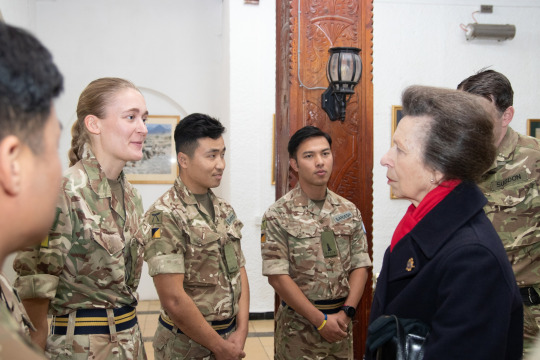
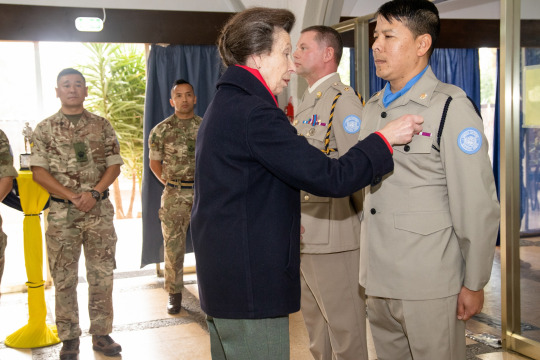
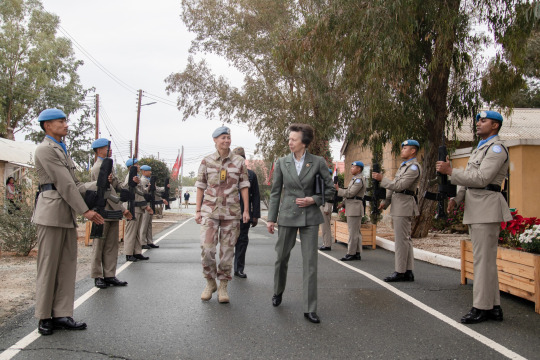
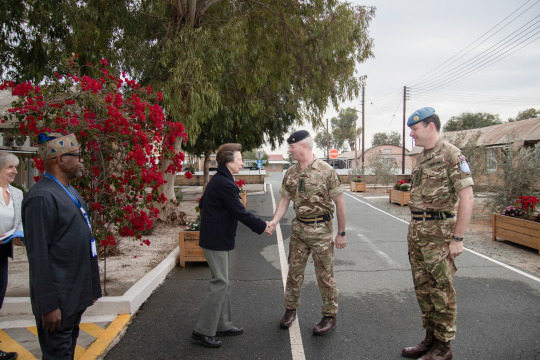
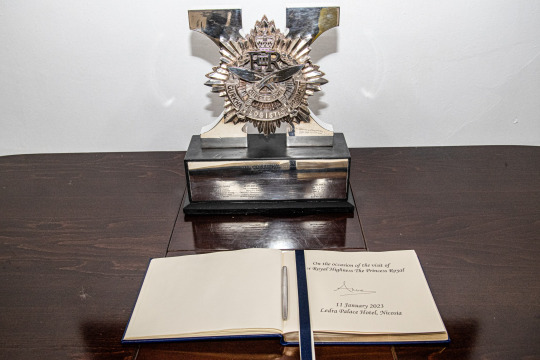
11 January 2023
On Wednesday, Her Royal Highness, The Princess Royal, visited 10 QOGLR deployed in Cyprus. She met personnel currently serving with the United Nations, who protect the Buffer Zone that runs through the island. As Colonel-in-Chief of The Royal Logistic Corps, she spoke with the soldiers and officers currently deployed on a six-month tour.
The visit included a Regimental honour guard, a display of the Pipes and Drums, and a public order training demonstration. It was a great honour for the Regiment to host her.
Jai QOGLR!
— Commander The Queen's Own Gurkha Logistic Regiment
25 notes
·
View notes
Photo
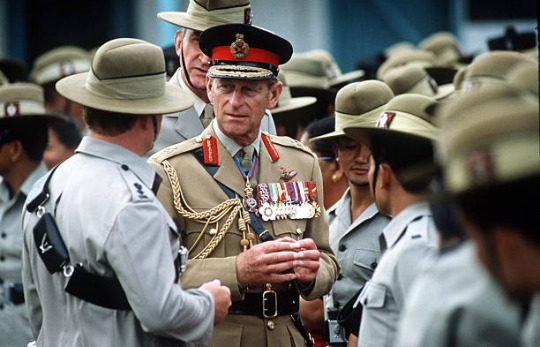
Hong Kong, 1986 - Inspecting Gurkhas of the 7th Regiment
11 notes
·
View notes
Text
Indian Army Day 2023: Date, images, Facts, Quotes, History.
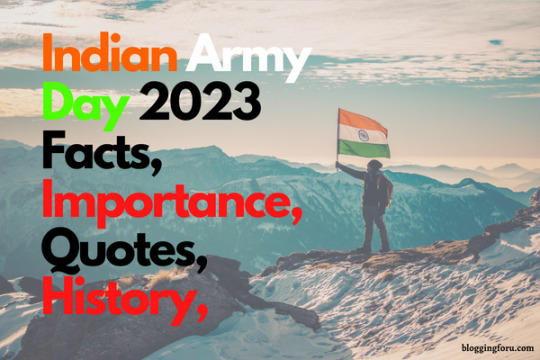
If you want to know about Indian army day, then you have come to the right place, we will give you all the information about Indian army day and you will know a lot of things about Indian army day so let’s start.
bloggingforu Provides You with knowledgeable and Informational content.
History Of Indian Army Day
Indian Army Day has been every year on the 15th day of January since 1949 , in order to honor general K.M. Cariappa for being the initial Indian chief in the Indian Arm. Prior to the time, Cariappa was the British was the commander-in-chief in the Indian Army.
General Cariappa was named the first Indian chief of staff on the 15th of January 1949 by the the Governor General at that time of India, Chakravarthi Rajagopalachari, succeeding General Sir Francis Butcher, the last British chief of staff in India.
It was a significant occasion in the development of an independent India and was a crucial move towards the transfer of authority to British rule to British into the Indian government. It also was a signal of India’s rising independence and the strength of its military.
Since the year 2000, Army Day is celebrated to commemorate the soldiers who sacrificed their lives in defense of the nation. It is also a time to celebrate the achievements achieved by Army, which is the Indian Army, and to recognize the sacrifices and contributions of soldiers currently serving.
The day is marked by parades and displays of the military across the nation. A wreath-laying ceremony is conducted to commemorate the tombs of fallen soldiers. The President and Prime Minister also wish the best to the soldiers of their Indian Army on this day.
How India Celebrates Indian Army Day?
Indian Army Day is celebrated across cities and towns across India every year on the 15th January of every year. The biggest celebrations take place in Delhi, the capital of India of New Delhi, where an elaborate parade is held in the Cariappa Parade Ground in the central city.
The parade includes an exhibition of military equipment and equipment as well as the parade of soldiers from different regiments of the Indian Army, Navy, and Air Force. The President of India and the chief participant at the event will oversee the parade and award the soldiers medals, awards and decorations in recognition of their extraordinary service.
In other cities in India parades are held in the cities of each city and cantonments for military personnel with troops and military bands who participate at the event. The celebrations take place at war memorials and military graveyards across the country where wreaths are placed on the graves of fallen soldiers.
It’s also the day that many schools and colleges are staffed by military personnel who teach students about how important the military is and its contributions for the national cause. Many families with soldiers visit their homes to show their gratitude to them for their work.
Happy Indian Army Quotes
“Yeh Dil Mangey More” — Capt. Vikram Batra
2. “If a man says he’s not afraid of dying, he’s either lying or he’s a Gurkha” — Field Marshal Sam Manekshaw
3. “Some goals are so worthy its glorious even to fail” — Capt. Manoj Kumar Pandey
4. “I shall not withdraw an inch but will fight to our last man and our last round” — Major Somnath Sharma
5. “We fight to win and win with a knockout because there are no runners-up in war” -General JJ Singh
6. “Only best of the friends and worst of the enemies visit us”
7. “There will be no withdrawal without written orders and these orders shall never be issued” — Field Marshal Sam Manekshaw

8. “Either I will come back after hoisting the Tricolour, or I will come back wrapped in it, but I will be back for sure” — Captain Vikram Batra
9. ” Some goals are so worthy, it’s glorious even to fail”– Captain Manoj Kumar Pandey
10. “No real change in history has ever been achieved by discussions” — Subhas Chandra Bose
#india#quotes#motivational quotes#indian army day#army day#army quotes#soldier#soldier quotes#blog#blogger#bloggingforu
2 notes
·
View notes
Text

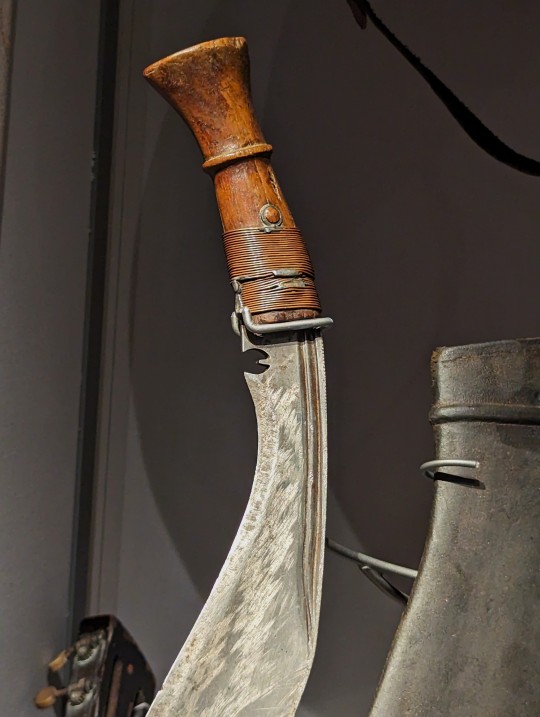
Chindit Kukri from the British Empire dated to the 1940's on display at the Cumbria Museum of Military Life in Carlisle, England
This kukri was carried by Lieutenant-Colonel Johnny Burgess who commanded the 34 Chindit Column 4th Battalion during the Burma Campaign. This was traditionally a Gurkha weapon but many British troops used them for jungle warfare during both the First and Second World Wars.
The Chindits often used them as many of them were from the Gurkha regiments. They were special operations units for the British and Indian armies during the Second World War that raided behind the Japanese Imperial lines. There is still some controversy behind how effective they were as long marches through malaria infested swamps, dangerous jungles and some early failures led to a high casualty rate.
Photographs taken by myself 2023
#military history#second world war#british empire#20th century#england#english#cumbria museum of military life#carlisle#barbucomedie
19 notes
·
View notes